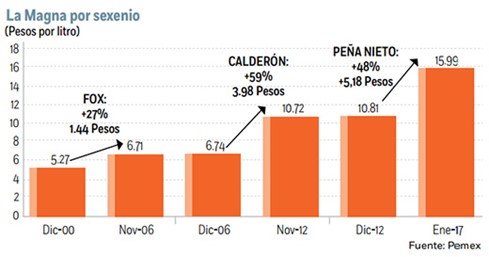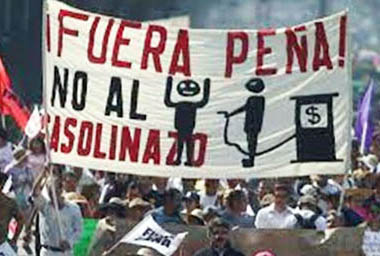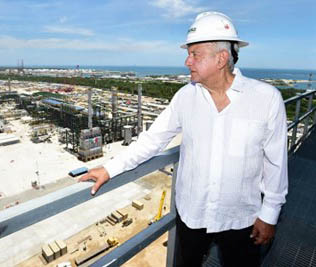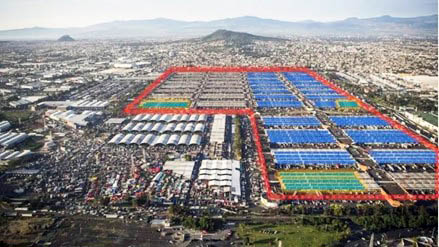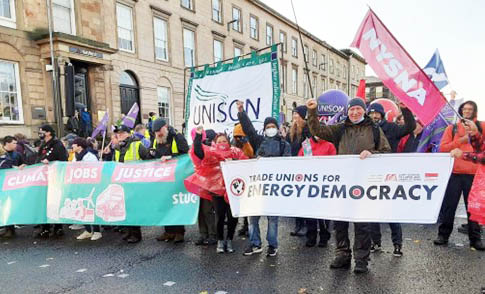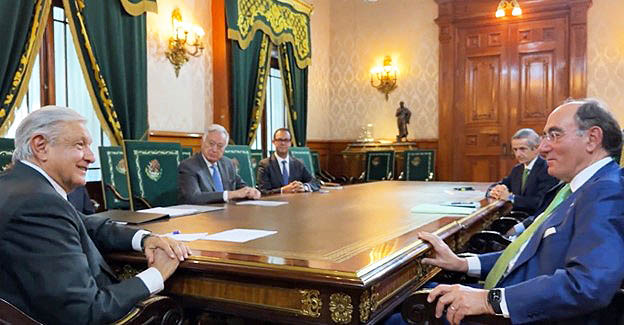|
|
|
|
The weekly newsletter of the México Solidarity Project |
|
|
|
Online at mexicosolidarityproject.org |
|
April 12, 2023/ This week's issue/ Meizhu Lui, for the editorial team |
|
|
Chalmers University of Technology |
|
Electrifying News on México’s Energy Sovereignty |
|
Let’s start this week with two stories.
The first: In Zimbabwe a while back, I stayed in a rural area with a woman who did all her cooking in a kitchen — a separate conical structure — that had a fire pit at the center and a smoke hole at the top. My host had no hot water. But she did have email. She would trek two miles to a village near the electrical towers that made wi-fi available. |
|
The second: A neighbor in the rural community where I live now was renting a tiny house from the owner of a big house close by. Her access to electricity? An extra-long extension cord that ran from her landlord’s house to hers. She and her landlord got into a spat when he raised the rent, and he literally pulled the plug. She couldn’t turn on any lights or keep her food cold.
We all depend on electrical power. Communism, as Lenin once famously pronounced, amounts to “Soviet power plus the electrification of the whole country.” Without electricity, he understood, his nation would “remain a small-peasant country.” Effective development simply demands electrification. But without public control over our electricity, the private “owners” can pull our plug — and wreak social havoc.
México, as Sean Sweeney relates in this week’s Voices, has just taken a major step toward reversing the neoliberal trend of leaving energy “to the market” and the machinations of private owners who don’t have the public interest at heart. Now more than ever, Sweeney explains, we need public ownership over our energy. We’ll never come to grips with global warming without it.
Private corporations, even those “into” renewables, can’t save our planet. But we the public, working together to protect consumers and the environment, most certainly can. |
|
|
|
Don’t miss an issue! Sign up for a free México Solidarity Bulletin subscription. |
|
|
|
|
Climate Change and México’s Energy Re-Nationalization |
|
Sean Sweeney directs the International Program on Labor, Climate & Environment at the City University of New York’s School of Labor and Urban Studies. He also coordinates Trade Unions for Energy Democracy, a global network of 102 unions from 32 countries that’s developing an independent trade union approach to energy transition and climate protection. TUED member unions are advocating for democratic control and social ownership of energy resources, and México’s electricity reform efforts, as Sweeney lays out in this New Labor Forum analysis, could set an enormously important precedent in the ongoing global struggle for climate protection. |
|
|
AMLO’s efforts to re-nationalize the energy sector — ongoing since 2019 — haven’t been supported by the international left. Why?
We on the left have opposed neoliberal reforms privatizing prisons, schools, health care and so on, but we’ve been MIA on privatizing energy. México stands as perhaps the only major country that’s been calling attention to the failures of energy privatization. That has, of course, raised the ire of the neoliberal US government and the private companies it represents. Many on the left, unfortunately, have joined with them in an unholy alliance.
Why? Because groups on the environmental left have become infatuated with renewable energy companies. They love public subsidies going to those private companies supposedly on track to save the planet.
In the economy overall, the left has opposed “structural adjustment” programs that open public sectors to private market forces that impoverish people at the bottom and concentrate astronomical wealth at the top. But many on the left don’t see that injecting private multinational renewable energy companies into power systems amounts to a “green structural adjustment,” an approach to climate protection both socially regressive and ecologically ineffective. |
|
Mexican President Cárdenas in 1938 expropriated foreign oil companies and nationalized the energy sector, an extremely popular move. How did oil and electricity get re-privatized in México and fall back under foreign control? |
|
|
In the 1980s and 1990s, the IMF and the World Bank decided they would no longer fund public energy systems unless they were moving toward privatization.
Electricity systems have three components: generation, transmission, and distribution. To have an efficient electrical system, these three elements must work together. But the privatization push broke these three elements up. In privatized systems, corporations sell electricity and make profits, but public dollars must fund and maintain power grids and distribution to the people.
Under Peña-Nieto, the president of México who preceded AMLO, lawmakers enacted some 20 legislative changes and three constitutional amendments that allowed non-Mexican companies to own and invest in México’s energy resources — and not just oil. Peña-Nieto welcomed foreign renewable energy companies into México and guaranteed their profits. These changes, all done in the name of “climate protection,” deliberately misled the Mexican people and had environmentalists buying into his reforms. |
|
The most immediate and obvious result would be soaring electricity and gas prices, called the gasolinazo. Demonstrations against the price increases popped up all over México. Enraged people even sabotaged and tapped gas lines!
It’s no wonder that the Mexican people massively support AMLO’s effort to re-nationalize energy. But that doesn’t mean that the Mexican people don’t care about the environment. |
|
|
Price of fuel increase sparks mass protest/Photo |
|
The Western press says AMLO’s oil policies — taking control of oil exploration and production, as well as building a giant oil refinery — reflect his addiction to oil and cavalier attitude toward climate change. A just criticism?
Some countries in the Global South do take a nationalistic stance. We didn’t cause global warming, these nations say, and we shouldn’t have to pay the price for solving it. So don’t tell us we can’t continue to use coal and oil.
Let’s be clear here: AMLO does not take that position. The transition away from fossil fuels, AMLO believes, requires a planned pathway to a clean energy future. Not every fossil fuel can be abandoned willy-nilly. México wants a carefully planned and coordinated transition to an efficient and socially just low-carbon system. México can only accomplish this transition with public ownership of the entire energy system. |
|
We need to see questions about ownership and sovereignty as central here: If a country doesn’t control its own energy, that country can’t control its own economy. It remains dependent on imperial colonial powers. Electrification will always be vital to national development. But privatized systems don’t provide universal access to electricity. They can’t make profits bringing electricity to remote rural areas. So they leave those rural areas out, just as privatized health and broadband systems have left those rural places out. |
|
|
AMLO at the Dos Boas refinery site/Presidencia |
|
Those private companies leave it up to the public sector to find the funding to provide services for all. |
|
AMLO put a moratorium on renewable energy auctions. Isn’t bringing in more renewable energy a good idea?
AMLO is focusing on ownership. His message: “I’m not against clean energy, I’m against dirty business!” Environmental groups did get upset when he closed down the “capacity auctions” that allowed foreign renewable companies to enter the energy marketplace. But those power purchase agreements locked in profits for the companies, and that meant higher electricity prices for consumers. |
|
The standard energy market structure guarantees renewable companies their money first, a guarantee known as “priority of dispatch.” But if the sun isn’t shining or the wind isn’t blowing, then burning gas to generate power has to kick in. This means that the federal electrical stations, under the public CFE agency, have to turn on and off, and powering up and down goes hard on the grid. |
|
|
México City now has the world’s largest urban solar project, a facility all publicly funded./Central de Abasto CDMX |
|
With money paid first to the private companies, the cost of maintaining the grid becomes prohibitive. The electrical stations go into a death spiral. With private renewables, energy generation becomes the enemy of energy transmission!
Should we all be concentrating on just a call for “green jobs”?
I used to think that way. But then I got to do a study for the UN Environmental Program on the impact of shifting jobs from the carbon-based to the renewable energy sector. Our research showed that without public ownership of the renewable sector, green jobs alone don’t solve rising emissions and climate instability. |
|
In 2012, the Rio +20 Earth Summit saw a fight between unions from the Global South and unions from Europe and the United States. Unions in the South saw green jobs programs as neo-colonial projects, with private renewable companies gaining control of energy in their countries, under the guise of “saving the planet.” |
|
|
Photo: TUED |
|
Some US unions, meanwhile, would support any project — be it in the carbon sector drilling for oil or a wind farm in the renewables sector — that delivered a good deal for their members, without considering the project’s effect on the working class as a whole.
In México, the electrical workers union, the SME, and the Technical and Professional Petroleum Workers both support AMLO’s re-nationalization plans.
If México succeeds in creating a public, sovereign energy system, what will the effect be on other countries, particularly those of the Global South?
What México is doing can be revolutionary. Many countries want to do what México is doing but face their own political constraints. AMLO is loudly declaring that we must consider energy a universal common good, not merchandise. To save the planet, yes, we must de-carbonize, but we must also re-nationalize, de-commodify, and democratize! |
|
|
|
Mexican president López Obrador in talks with Iberdrola officials. |
|
A ‘Second Nationalization’ of Electricity Advances |
|
Last week, less than a month after hundreds of thousands of Mexicans mobilized to mark 85 years since former Mexican president Lazaro Cardenas nationalized México’s oil industry, the López Obrador administration announced its plans to purchase 13 electric energy generation plants owned by the Iberdrola, a major energy multinational based in Spain. México’s federal power utility, the Comisión Federal de Electricidad, the CFE, will operate the plants. The Trade Unions for Energy Democracy Bulletin has just published a perspective on the purchase, and we offer an excerpt here. “The rescue of the CFE,” said president Andrés Manuel López Obrador in Tuesday’s televised announcement, “represents “a new nationalization of the electricity industry.” “Most important of all, in this way, we guarantee that electricity prices will not increase for consumers, as has been the case in the last four years,” López Obrador added. With hydroelectric plants “being rehabilitated with new turbines, all under the CFE,” AMLO continued, “we can affirm that the Mexican state will maintain around 65 per cent of all energy generation at the end of my six-year term.” “México is the country with the lowest energy rates in the OECD,” observed Energy Ministry secretary Roció Nahle “because with PEMEX (Petroleos Mexicanos) and CFE, it allows us to have rates below inflation.” Currently, nearly 40 per cent of the energy generated by the Comisión Federal de Electricidad comes from clean energy: 67 per cent hydroelectric, 24 per cent nuclear, and 9 per cent geothermal, with solar and wind projects also underway. |
|
|
Recent news reports and commentaries, from progressive and mainstream media,
Daniele Nalbone, 40 migrants died protesting their treatment by México-US immigration police, Il Manifesto. The fire at a detention facility in Juárez broke out after a protest that some said came because detainees had not been given water.
Desafiado a EE.UU., avanza la "segunda nacionalización" de la electricidad en México, Boletín TUED. El Gobierno mexicano firmó el martes un acuerdo para la compra de 13 plantas de generación eléctrica a la multinacional española Iberdrola. La compra convierte a la empresa estatal en propietaria mayoritaria en la generación de energía eléctrica en México.
Mateo Crossa and Nina Ebner, The Drive Behind Tesla’s New Manufacturing Plant in México, NACLA. México’s conversion into an enormous export manufacturing platform dedicated to supplying the insatiable US market has not resulted in the modernization and industrial development industry promoters promised.
Néstor Jiménez y Alonso Urrutia, Mayor control sobre venta de armas, pide el Ejecutivo a Biden, La Jornada. En conjunto con la estrategia legal que emprende el gobierno mexicano en la Unión Americana contra armerías de ese país, AMLO sostuvo que lo que pide su administración es “más control y que no se venda de manera libre el arsenal de alto poder en Estados Unidos, que se controle”, porque causan daño a los pueblos de ambas naciones.
Ben Norton, México’s AMLO calls out US ‘oligarchy’ at Biden’s ‘democracy’ summit, Geopolitical Economy Report. López Obrador used the U.S. “Summit for Democracy” to indirectly call out Washington’s hypocrisy, arguing that the U.S. government — to be truly democratic — needs to challenge the power of economic elites.
Comunidades y organizaciones celebran iniciativa presidencial sobre minería, La Coperacha. La Colectiva Cambiémosla Ya, integrada por comunidades y organizaciones, celebró la iniciativa del ejecutivo al “sentar las bases” para regular en materia de minería y con ello “frenar los atropellos” que durante estos 30 años se han cometido en nombre de un “desarrollo” que ha beneficiado a unos pocos.
Lydia Polgreen, The Rich World Has a Shockingly High Tolerance for Cruelty, New York Times. Behind the fire at the Ciudad Juárez detention center for asylum seekers that left 39 dead: the reality that rich countries are keeping displaced people stuck in “third countries,” leaving only a matter of time before these holding-pen nations find themselves in crises destabilizing “safe” refuges and creating further humanitarian disasters.
Alejandro Páez Varela y Álvaro Delgado Gómez, Sheinbaum y Ebrard vienen de distintas alas de la izquierda, expone Alejandro Almazán, Sin Embargo. El escritor periodista Almazán dijo que si Marcelo Ebrard llegara a ganar la Presidencia de la República en 2024 probablemente sumaría a personajes de la derecha en su gobierno, caso contrario de Claudia Sheinbaum de quien señaló se enfocaría en conservar esa izquierda que aún pertenece al pueblo.
Katie Smith, How cartels use illegal wildlife trafficking to make fentanyl, NewsNation. A legal wildlife trade between México and China does exist, but ongoing illegal trafficking threatens México’s biodiversity and helps support criminal money-laundering activity. |
|
|
The Mexico Solidarity Project brings together activists from various socialist and left organizations and individuals committed to worker and global justice who see the 2018 election of Andrés Manuel López Obrador as president of México as a watershed moment. AMLO and his progressive Morena party aim to end generations of corruption, impoverishment, and subservience to US interests. Our Project supports not just Morena, but all Mexicans struggling for basic rights, and opposes US efforts to undermine organizing and México’s national sovereignty.
Editorial committee: Meizhu Lui, Bruce Hobson, Bill Gallegos, Sam Pizzigati, Courtney Childs, Victoria Hamlin, Agatha Hinman, Steven Hollis, Daniel McCool, Betty Forrester, Jesús Hermosillo. To give feedback or get involved yourself, please email us! |
|
|
|
Subscribe! Get the México Solidarity Bulletin in your email box every week. |
|
|
|
Web page and application support for the México Solidarity Project from NOVA Web Development, a democratically run, worker-owned and operated cooperative focused on developing free software tools for progressive organizations. |




